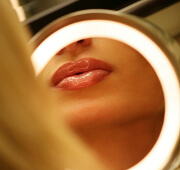
Only by the Spirit can we look beyond the obvious and perceive the hidden. As Scripture tells us, man looks at the outward appearance, but the Lord looks at the heart (see 1 Sam. 16:7).
I learned early on the pain of being judged by the human perspective of outward appearance. When I was 5, I lost my right eye to cancer. Before the surgery, everywhere my parents took me, people would stop them and comment, “What a pretty little girl! What beautiful eyes!”
Such compliments always made me uncomfortable when I was young. I was confused because the people looked at me, but talked about me to my parents. I would just stand there as my mother or father collected the compliments on my behalf. Then one of my parents would inevitably prompt, “What do you say?”
I’d murmur, “Thank you,” while dropping my head or looking away.
I didn’t care about being called pretty. To me, pretty was almost an insult. I wanted someone to say, “What an incredible tree-climber you have there!” or “She swims like a fish!”
That was me. Pretty was girlish, and I was an avowed tomboy!
When my eye was removed, the majority of my compliments ceased. Instead, people made strange faces.
They studied me from a distance, but still looked a little closer than was comfortable for me. They’d drop their voices to a whisper and ask my mother, “How is she?”
I wanted to yell, “I’m fine. I’m not my eye! I’m not weak; I’m still the same!”
My surgery took place during the school year. The kids at school called me “one-eye” and “Cyclops.” Many days I ran the two miles home from grade school while kids jeered at me from the opposite side of the street.
I pretended I couldn’t hear them and held back my tears until I was home. My mother held me and told me kids this age were cruel, assuring me that when I grew up it would not be like this.
Even at 5, I knew I was not the way I was perceived. I fought against the concept that I could be measured by how I looked. But later in life I embraced this shallow standard.
As children we are not immediately indoctrinated by cultural influences. These forces take some time to mold the metal of our souls. But once the metal is forged, it cools quickly into a hard, rigid standard by which we continually measure ourselves and others.
It is not long before little girls can’t wait to be grown-ups. They long to adorn themselves in the outward accessories of makeup and jewelry. They play dress-up and put on cosmetics when they are possibly at their prettiest.
Soon they are teens, and they dabble daily in what was once only play. They begin to think they are not pretty without makeup, and what was once reserved for special occasions becomes a daily mandatory ritual. They want to look and act older.
Then something dreadful happens. They finally reach the age they had longed to achieve, and now they are bothered with the worry of getting old. If 16 to 26 is the optimum age range, it is a very short time in the whole scheme of life. As young women approach 30, they no longer want to look older—they want to look younger!
This is a no-win situation for women. Men don’t seem to wrestle with their age quite as much.
Their maturing process is more normal. They want to grow up and become independent, but then they don’t wig out because they look older!
Some women even lie about their age or go to great lengths to hide it. Not content to look great at their real age, they want to appear younger and wiser.
But youth and wisdom do not often go together. Wisdom comes with time, obedience and application of truth. Often we do not have access to these insights until we are old enough to appreciate their importance.









Leave a Comment
You must be logged in to post a comment.